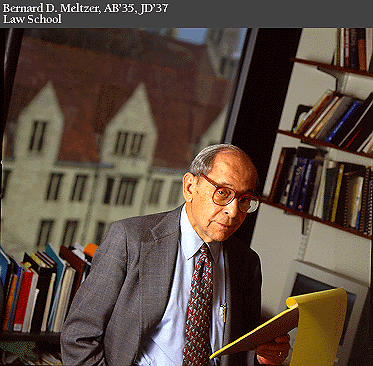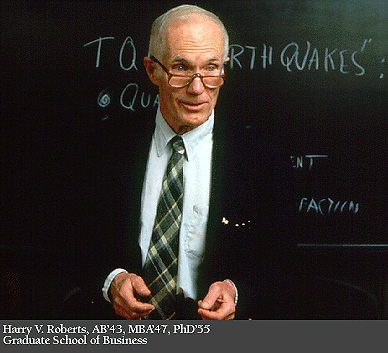
The University of Chicago Magazine
June 1997
Continued

The Edward H. Levi distinguished service professor emeritus, Bernard Meltzer joined the Law School faculty in 1946, after serving on Justice Robert Jackson's staff at the Nuremberg war crime trials. At Chicago, his classes in Labor Law and Evidence were informed by his groundbreaking scholarship in those fields. As a teacher, he has combined rigorous intellectual standards with warmth and interest in students' welfare beyond the classroom.
Ioften said, "I don't know" and "What could the other side say?" A teacher must show respect for his subject matter and for his obligations to his students. It's hard to expect students to do the things that you have failed to do. So you have to raise all relevant considerations and recognize the difference between the classroom and the soapbox.
The hardest part is to give students a sense of their weaknesses as well as their strengths and to help them to cope with both. You want to encourage a student to stretch, but if you think he is stretching for things that are beyond him, you have to be honest as well as tactful.
I enjoyed teaching Evidence as much as anything. In Corporation Law, you have relatively few principles and rules. The real problem is to look at a complicated transaction and say, "What monkey business, if any, are these players up to?" Once you figure that out, it's relatively easy. In Evidence, the situation is much less complicated, but the web of doctrine that the shortest question might raise is very large.
Often a student would say, "Well, this is unjust, this is unfair." Justice and fairness are, of course, very important elements. But to make the law something more structured and predictable than an exchange of gut reactions, you've got to be able to convert your sense of justice or injustice into an argument that fits within the tradition. Karl Llewellyn, my late colleague, once said, "Ideals without technique are a mess; technique without ideals is a menace."

For almost four decades, Harry Roberts, the Sigmund E. Edelstone professor emeritus of statistics and quality management in the Graduate School of Business, taught introductory statistics and the statistical-methods sequence to students in all three of the GSB's programs and advised nearly 75 Ph.D. students. In 1993, he inspired the formation of the GSB Quality Alumni Club, a worldwide professional organization of almost 200 alumni, faculty, and students. In his honor, the club has created the Harry V. Roberts award for commitment to quality management. Because Roberts has been ill this spring, his comments on teaching are adapted from his 1995 book, Academic Initiatives in Total Quality for Higher Education.
A major reason that teaching at the Business School is very good is one that would be abhorrent to W. Edwards Deming: For a quarter-century Chicago has had public course evaluations. The ratings are widely read by students, faculty, and administrators. Faculty accept them as valid and respond to the incentive they create. Faculty want to be good at anything they do that can be measured!
The key idea behind "student as customer" is that faculty should assume some degree of responsibility for student success and avoid the rationalization that poor student performance is beyond faculty control. This can come as a by-product of trying to improve one's teaching, as in two-way fast feedback. Notice that students can't tell much about what to teach, but they can tell very accurately when they are confused, bored, or skeptical about the value of the course.
Through time the frequency of flaws and muddy points is gradually reduced, and the professor learns general lessons about teaching. For example, students can never get too many concrete examples to illustrate theory. They are frustrated by course reading packets that contain vastly more material than they can possibly read. They often are inherently skeptical about the value of course material, and a little "marketing" by the professor can reduce this skepticism.
Tension between better- and poorer-prepared students is inevitable, but it can be managed if the professor has current information on the problems faced by each group..
[Follow link below to continue story.]
Continue reading "STYLE AND SUBSTANCE"
Go to:
- INVESTIGATIONS
- CHICAGO JOURNAL
- EVENTS
- LETTERS
- CHICAGOPHILE
- Feature story, "Theory in Practice"
- Feature story, "Style and Substance"
- Feature story, "Sampling Paradise"
- Feature story, "Vocal Ease"
- CLASS NEWS
- DEATHS
- BOOKS BY ALUMNI
- IN THE CLUBS
Return to June 1997 Table of Contents